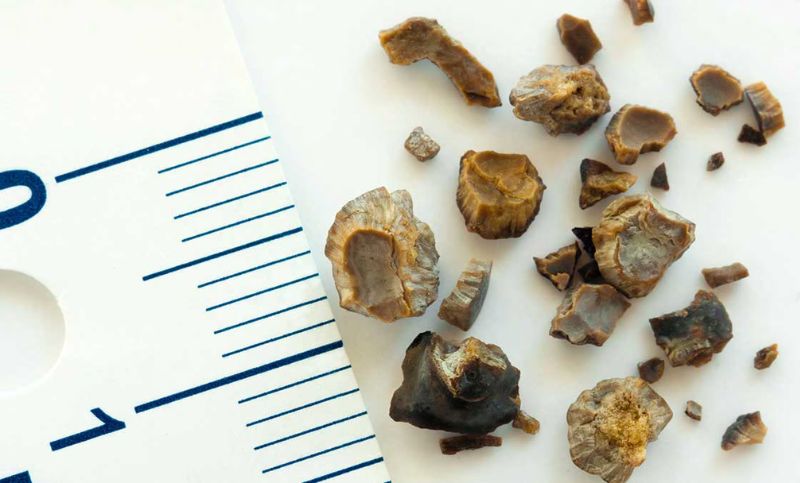Understanding Kidney Stones: Causes, Symptoms, and Treatment Options
Understanding Kidney Stones: Causes, Symptoms, and Treatment Options

While most kidney stones will pass on their own accord, larger stones may require surgery. Here’s an overview of kidney stones.
The kidneys are vital organs that filter water and other waste products from your blood, produce urine and hormones, and maintain levels of minerals in your bloodstream. They are small and bean-shaped and are located in the upper back of the abdomen.
What Are Kidney Stones?
Kidney stones are hard, solid crystals of various sizes formed from the salts in urine. They can cause pain and infection, and blockages may result in kidney damage or failure and other urinary tract complications.
Roughly 1 in 20 people will experience kidney stones in their life, and they are more prevalent in men. Some kidney stones are quite small and will pass on their own accord, but larger stones some will require surgery if they are too large to pass. If there is a blockage from a stone and an infection, then surgery is also needed.
There are four main types of kidney stones:
• Those formed from calcium combined with oxalate or phosphate (these are the most common).
• Struvite stones, which are caused by a urine infection and magnesium and ammonia.
• Uric acid stones, which caused by too much acid in the urine. These can be sharp and quite large.
• Cystine stones, which are quite uncommon. They are hereditary and are more crystalline than other stones.

Causes of Kidney Stones
Kidney stones are caused by high calcium, oxalate, cystine or uric acid in the urine. Some medical conditions may result in levels of these substances increasing. Most of the time, no blood or urine problems is identified, and the levels of calcium, oxalate, cystine or uric acid are normal. It is thought that the most common cause is chronic dehydration.
Symptoms of Kidney Stones
Symptoms of kidney stones include:
• A stabbing pain in the lower back, just below the ribs. This can be quite severe
• Small stones in the urine (often caused by uric acid stones)
• An urgent need to urinate
• Shivers, sweating and fever, cloudy or bad-smelling urine – if there is a urinary infection

Treatments
As long as there is no infection, stones less than 5mm in size can be treated non-surgically. If the pain is manageable, the stone may pass in 4-6 weeks. Some patients may not wish to try and pass the stone, and hence it can be removed surgically.
If the stone is too large or the patient wishes to have treatment, surgery can be performed. If there is an infection, then the kidney is unblocked surgically by insertion of a drainage tube, and the stone is treated once the infection settles.
Ureteroscopy
During a ureteroscopy, no incisions need to be made; rather, the ureteroscope is inserted into the urethra and then passed through the bladder and into the ureter. Sterile fluid is used to visualise the ureter and kidney.
Kidney stones in the ureter may be removed using forceps or a “basket” attached to the channels on the ureteroscope. Smaller stones can be removed in one piece, but larger ones may need to be broken down into smaller pieces before they can be taken out.
Dr Arianayagam routinely uses a laser to break stones. Some stones are fragmented into dust while others are broken into pieces and then removed with a basket.
Percutaneous Nephrolithotomy
Percutaneous nephrolithotomy may be performed if the stone is huge or even fills the whole kidney (Staghorn calculus). This involves puncturing the kidney from the outside and inserting a special camera into the kidney from the back. The stone is then broken and removed with a combination of ultrasound, laser and suction. It is far less invasive than open surgery.
Extracorporeal Shock Wave Lithotripsy
ESWL is the least invasive surgical kidney stone treatment. It employs high-frequency sound waves from an external source to break the stones into smaller pieces. They then pass through the urine. ESWL was the main treatment used for stones in the kidney until the advent of the laser. Currently, most stones are broken with a laser rather than shock wave lithotripsy.
Treating Kidney Stones with Urology Specialist
Dr Arianayagam is a highly skilled urological surgeon with a wealth of experience in all urinary diversion procedures.
After training in NSW further training in Urologic Oncology, he was undertaken at the University of Miami Miller School of Medicine. He completed a two-year fellowship accredited by the Society of Urologic Oncology.
While he is primarily a urological cancer surgeon, Dr Arianayagam also sees patients with general urological problems, including stones in the kidneys, ureters or bladder. He is happy to help anyone with kidney stones urgently as he is aware of how much pain stones can cause.
If you have any questions or would like to book an appointment, please feel free to contact or call Dr Arianayagam’s office on 1300 307 990 and his staff will be able to assist.
Learn some more about other surgeries Dr Arianayagam provides:
Everything You Need To Know About Cystoscopy

The Benefits of Drinking Water for Urological Health: Do You Really Need 8 Glasses a Day?
We’ve all heard the advice: “Drink eight glasses of water a day” But is this rule as important as it…

Protect Your Kidneys: Simple Habits for Better Health
Keeping your kidneys in shape is vital for reducing the risk of chronic disease. Check out some of our top…






